How 2020's 'The Secret Garden' differs from previous adaptations (exclusive)
Watch: The Secret Garden trailer below
First published in 1911, Frances Hodgson Burnett’s novel The Secret Garden is widely recognised as a classic of English children’s literature, and has been adapted countless times, on stage, on television, and on film.
The first filmed version – sadly now lost – was made just eight years after publication in 1919, while its most recent big screen adaptation, produced by Francis Ford Coppola, came in 1993. Now, in 2020 a new version of the classic childhood tale – which sees a young girl discovering a hidden oasis on her uncle’s land – is being released into cinemas and on Sky Cinema on 23 October.
Produced by Heyday Films and Studiocanal – the team who brought us Paddington and Paddington 2 – this new version stars newcomer Dixie Egerickx in the lead as Mary Lennox, with Colin Firth as her uncle Archibald Craven and Julia Walters as the housekeeper Mrs. Medlock, and promises to do something different with the source material.
Read more: The best new releases on Now TV and Sky Cinema in October
Speaking exclusively to Yahoo Movies UK, producer Rosie Alison (The Boy In The Striped Pyjamas/Testament of Youth) explained that, along with moving the story from the Edwardian period into a post-war setting, the new adaptation draws heavily on Burnett’s own memoirs to offer a new perspective on the tale.
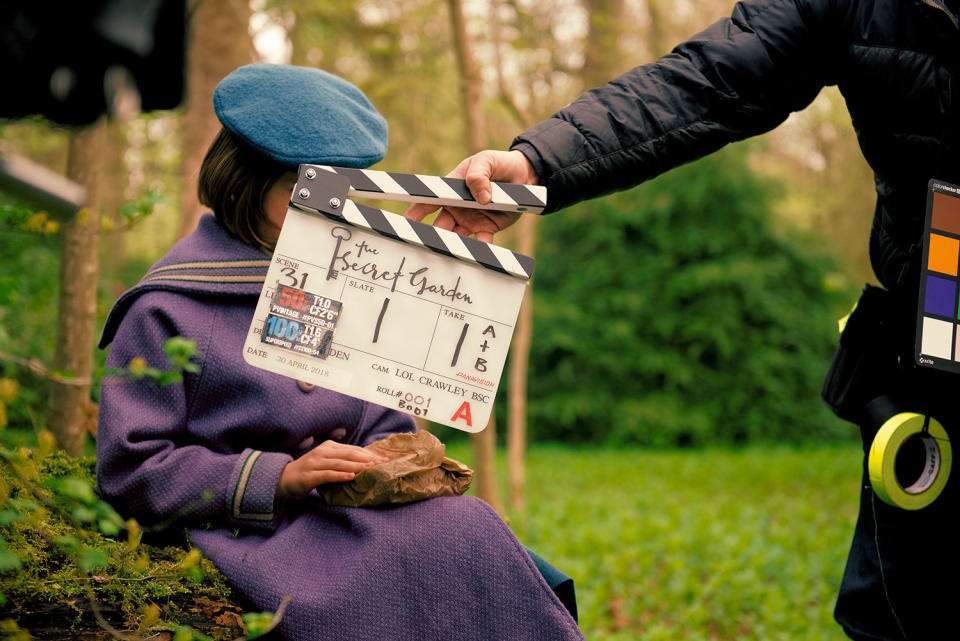
They’ve “done more to emphasise the power of imagination which underpins the story,” Alison explains. “This is particularly true of our version of the garden,” which appears more fantastical than previous adaptations.
“For this we drew from the author's fascinating memoir (‘The One I Knew Best of All') in which she recalls a key moment in her childhood when she entered her very own ‘secret garden’ in an abandoned house near an industrial quarter of Manchester. It’s a revelatory account.. [and] clearly a seedbed for her great novel.”
Read on to learn more about The Secret Garden, and to see some exclusive new behind-the-scenes photos from the making of the film.
Why did you decide to adapt Frances Hodgson Burnett’s The Secret Garden?

Rosie Alison: Like so many, I’ve loved this novel since childhood. There’s something so simple yet universal about the idea of a secret garden – and a lonely child in a wintry house finding that hidden lost place with the power to restore and heal her life through nature, and friendship. It’s one of the great redemptive fables. But although I’ve enjoyed all the various filmed versions, the last film was nearly 30 years ago, and it feels worthwhile to try and keep this story fresh for a new generation to discover.
Read more: The latest on Paddington 3
It was important to us to honour Frances Hodgson Burnett’s creation and the spirit of her original novel, but we also wanted to make this a new interpretation. Frances Hodgson Burnett herself encouraged people to read between the lines of her stories – in her own words, “between the lines of every story there is another story, and that is one that is never heard and can only be guessed at by the people who are good at guessing.”
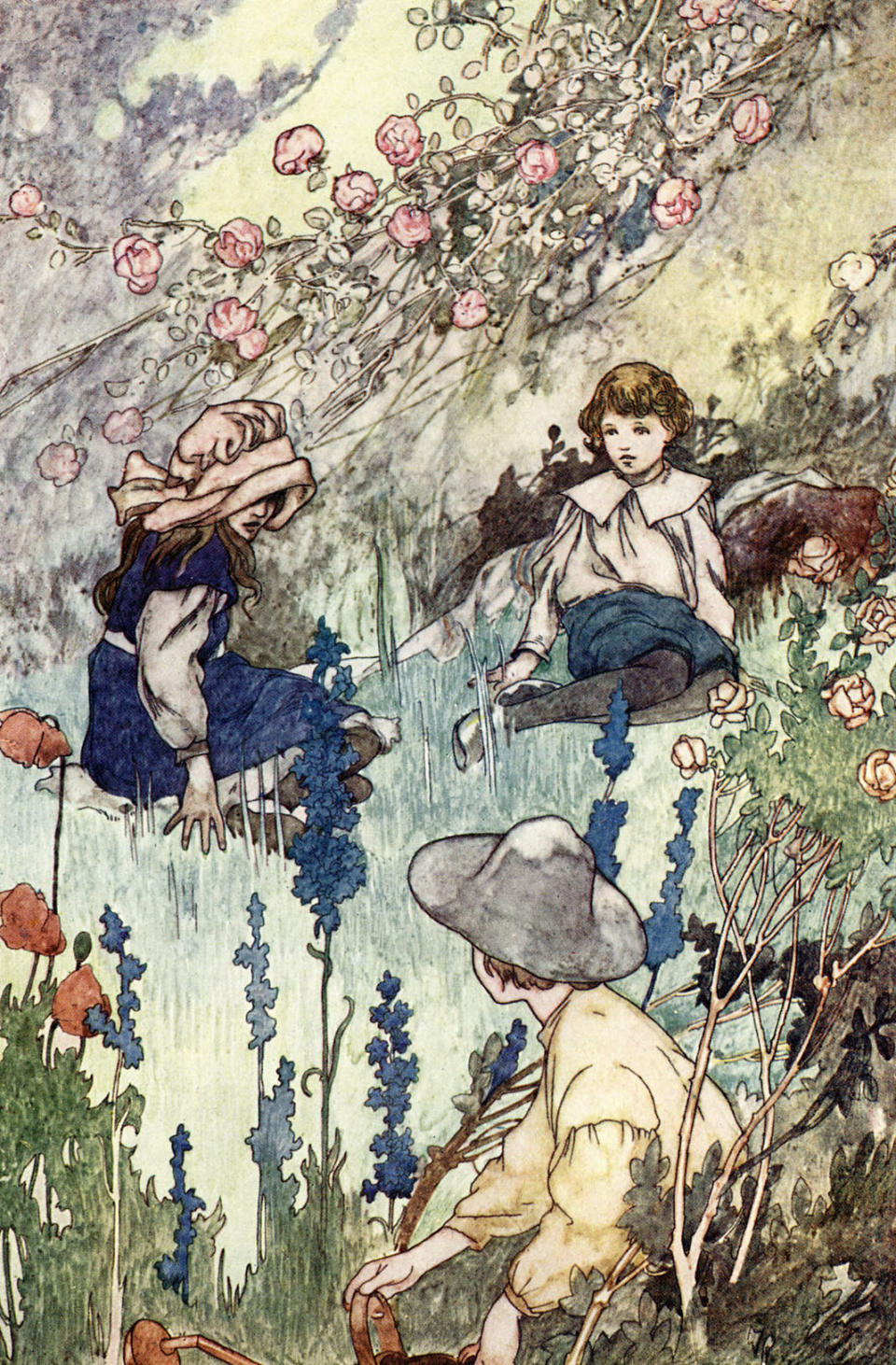
Frances Hodgson Burnett’s great-great-granddaughter Keri Wilt has observed that a strength of The Secret Garden is how the story speaks to different people in different ways, at different stages of their lives – each according to their own needs. There are so many rich layers to this fable, and it’s possible to have different emphases in different versions.
What makes The Secret Garden (2020) different from other adaptations?

In the gallery of adaptations, we see ours as a more subjective ‘first person’ account of the story, experienced through Mary’s eyes. The boundaries between her imagination and the world around her are more fluid than in past versions. And because the film is seen more from her perspective, this also narrows the window available for the other characters - for example, the 1993 film had a more third person perspective, switching into separate scenes with Mrs Medlock and Martha, the kitchen staff, and Archibald.
We’ve also done more to emphasise the power of imagination which underpins the story. This is particularly true of our version of the garden. As seen through an imaginative child’s eye, it appears more boundless and without edges. And it is a wilder garden (this speaks in part to our times, with the greater enthusiasm for re-wilding gardens.) Our garden has a more reciprocal, symbiotic relationship with the children: we wanted to suggest ways in the natural world can seem to echo or reflect their moods, and respond to them, as if imagination plays a greater part in their relationship to nature.
Read more: Hollywood’s unluckiest studio
About our emphasis on ‘imagination’: for this we drew from the author's fascinating memoir (‘The One I Knew Best of All') in which she recalls a key moment in her childhood when she entered her very own ‘secret garden’ in an abandoned house near an industrial quarter of Manchester. It’s a revelatory account of a small child who transforms a sooty wasteland through her imagination – clearly a seedbed for her great novel. She describes entering the lost, hidden garden of Page’s Hall through a little green door in a high wall - and when she “passed through the enchanted door,” the place was a wilderness of smuts and cinders:
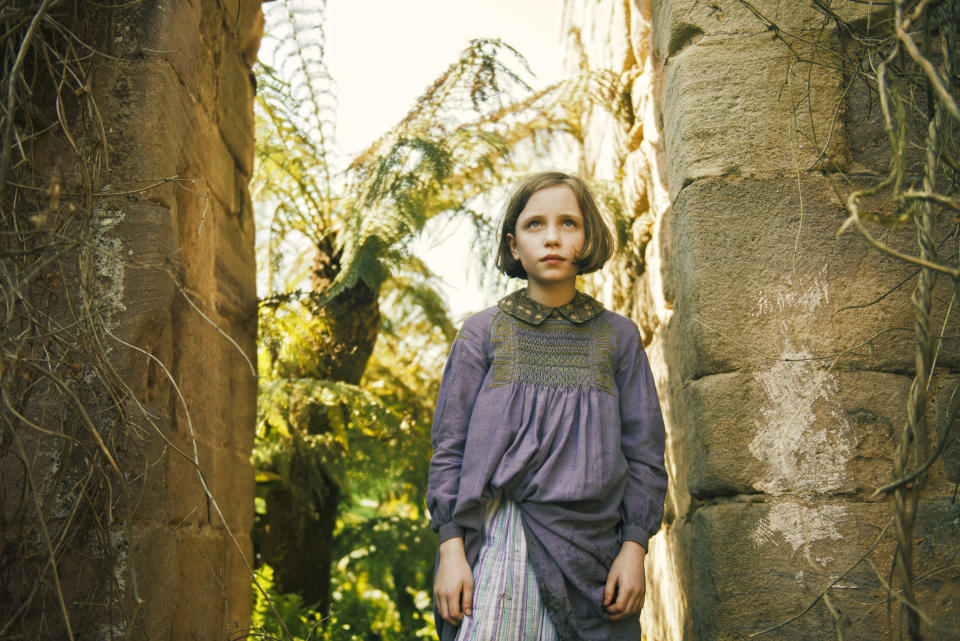
“So she wandered about in a dream - “pretending." That changed it all. The heaps of earth and rubbish were mounds of flowers, the rough, coarse docks were lilies with broad leaves, every poor green thing struggling for life in the hard earth had a lovely name… She walked about slowly. “Pretending” with all her power. She bent down and looked the weeds in their faces and touched them tenderly… suppose they were roses and pansies and lilies and violets, how beautiful they would be!... “You are roses!” She said. “You are violets – and lilies – and hyacinths and daffodils and snowdrops! You are!"
It's a very moving primal memory of a lonely child who was able to transform this desultory garden through her imagination. It was the beginning of her life as a storyteller too.
Drawing from this, alongside the novel, in our film we’ve tried to create an ambiguity between how much of the beauty which Mary sees in the garden might be ‘real’, and how much might be her own imaginative projection or response, as she opens herself up to the world around her. From the moment we meet her in our version, we are aware of Mary as an imaginative storyteller.
The garden is such a key element of the story, how did you approach bringing it to life on screen?
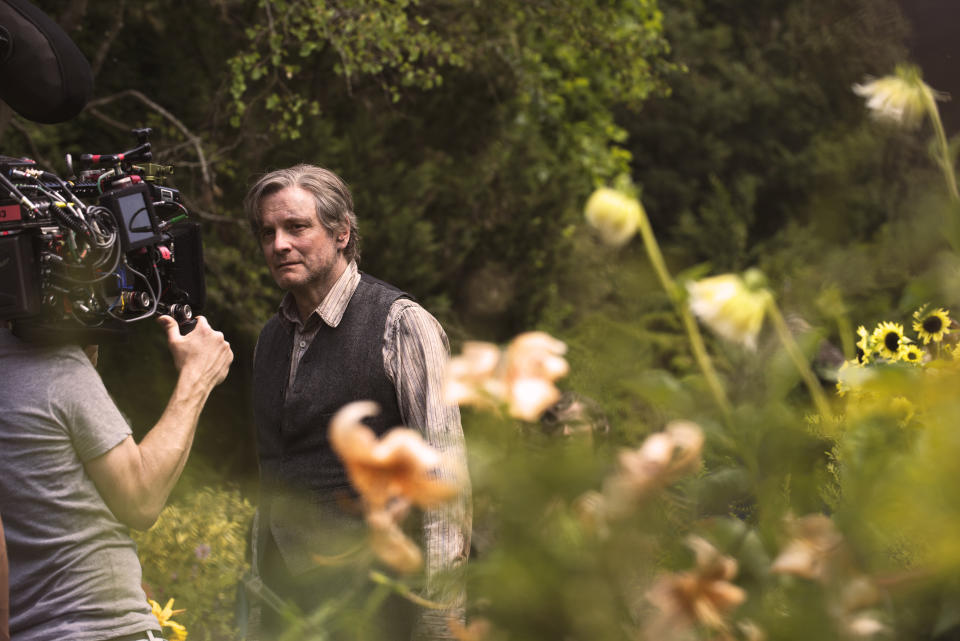
Despite the role of imagination in our garden, of course we most certainly didn’t want to ‘reinvent’ nature or create a fantasy too far removed from ‘reality'. Therefore our garden was filmed in ‘actual’ gardens, carefully chosen, as we did our best to celebrate the glory and wonder of nature itself, and how that might unlock an onlooker. (We were also very lucky to film in a summer of unbroken sunshine.)
Read more: The best films at London Film Festival
So while there are a few key moments where we used CGI to evoke the children's imaginative response to the garden (such as the flowers growing fast in a sequence suggesting spring’s wondrous arrival, or gunnera wilting when the children's moods fall), our garden isn’t ‘artificial’ but is filmed in particularly inspiring gardens chosen all over the UK (in Yorkshire, Wales, Cornwall, Somerset, Forest of Dean, Dorset and Hertfordshire.)
What do you feel that Mary and Colin mean when they speak of the ‘magic’ of the garden?

Within The Secret Garden, Frances Hodgson Burnett frequently mentions what Mary and Colin call ‘magic’. There is even a whole chapter called ‘Magic’ – which seems to be the spirit of nature whose mysterious power they feel and respond to, and are healed by. This sense of ‘awakening through nature’ is something we hope to evoke in our version of the story, with an apparently sentient garden in a symbiotic relationship with the children.
Some people might question why we have not made more of the ‘hard graft’ self-reliance aspect of the story – that Mary cures herself through hard work in the garden. But in our adaptation, the emphasis is more on Mary being awakened by her immersion in a wilder spirit of nature: how the garden opens up the children, and heals them as they learn to connect and commune with what Hodgson Burnett repeatedly calls ‘magic’, something mysterious yet manifested through the garden.
You’ve said this adaptation draws from ‘the story behind the story’ – what do you mean by this?

Well, besides drawing from the ‘imaginative secret garden’ of her childhood memoir, our adaptation delves further into Mary’s interior life. We’ve tried to mine further into the mystery of family griefs blighting Misselthwaite; the characters’ emotional hauntings through bereavement have become a ghost story in our film.
Frances Hodgson Burnett encouraged readers to read between the lines and guess at what is hidden within her books, and in so doing, it seemed to us perhaps strange that Mary would never give a thought to her dead parents, the source of her own pain. So we explored Mary's emotional haunting through a mix of memories and ‘ghosts’.
Read more: Daniel Craig shares advice for next James Bond
We tapped more into the roots of the grief underlying the story (the spirit of grief in which the author wrote it, long after the trauma of losing her own son, together with her well-documented lifelong struggle with depression.) It is in part a story about damaged children learning to break cycles of inherited family grief in a house haunted by its past. Perhaps it became, for us, as much about Mary and Colin beginning to understand the mysterious frailties of their parents.
What else have you changed from the original novel, and why?
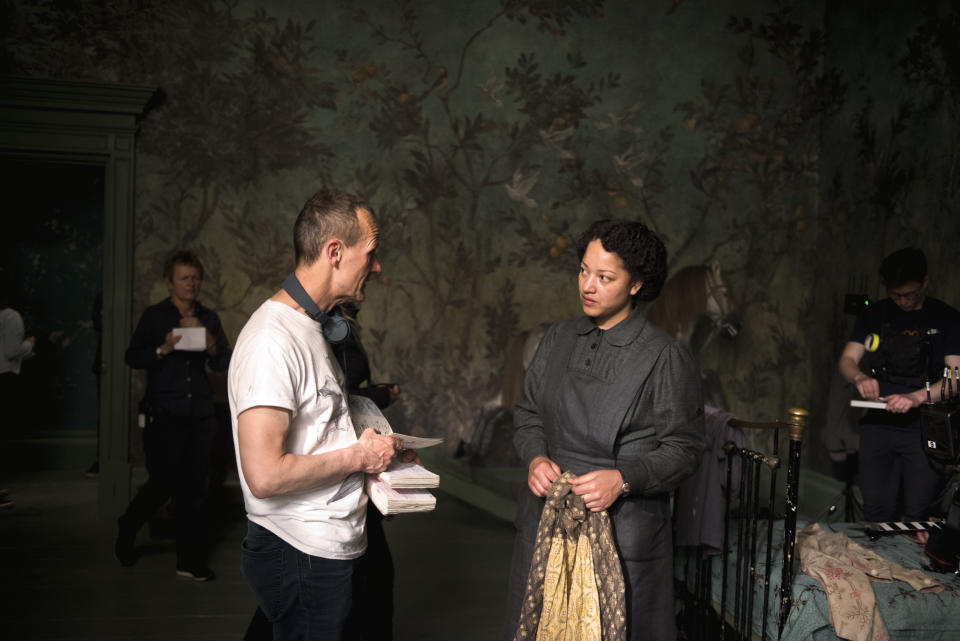
Mary still begins the story as the fierce, blindly entitled, emotionally neglected child of the novel – who is gradually opened up by the garden, and ends up rescuing Colin from the parental disconnection she had suffered herself. But we have pared away some of the secondary characters to intensify the core relationships of the story. We have laid more emphasis on the psychodrama between grieving Archibald, and his own projection of his depression onto his sick son Colin – the curious Munchausen by Proxy case which is at the heart of the original story.
We also shifted the time period. Originally published in 1911, we felt it might become less remote to today’s children if we brought this story away from Edwardian bonnets, whilst still keeping it firmly within ‘the past’. We have reset it just after the Second World War, in 1947. That way, Mary’s initial tragic loss of her parents in India is within a cholera epidemic during Partition. And Misselthwaite Manor is just recovering from the shadow of war, after being used as a wartime hospital for soldiers. So the atmosphere of grief which Mary has to cope with is more than personal – they are all emerging from the aftermath of war.
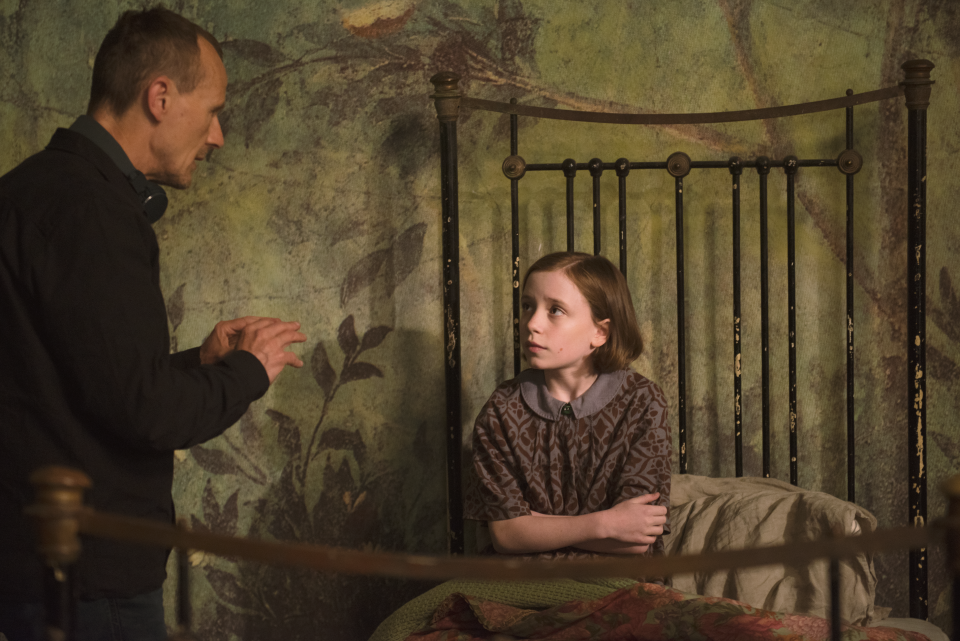
At the climax of the story, we have introduced a fire at Misselthwaite. With Mary being so central to our telling, for her to be able to rescue her uncle so actively felt to us more dramatically satisfying. It’s a story about casting off history, and breaking the cycles of family grief, and it seemed as though Misselthwaite, with its accumulated griefs, might be purged through burning. The choice also underpins the novel’s strong gothic kinship with Jane Eyre, so evident in other aspects throughout the story. The fire allows for a cleansing and the house’s rebirth at the end of the film, alongside the family.
What do you hope people will take away from the film?

We see this both as a children’s story but also a story about childhood. It’s a story which seems to affect children deeply, so I hope we reach some! It speaks in particular to children who might feel marginalised or lonely: Mary is such a singular and memorable creation, a difficult outsider who thaws and transforms as she finds her way to friendship, via the garden.
Read more: How well do you know James Bond?
She’s performed here with such spirit and nuance by Dixie Egerickx – who shines with all the astuteness of childhood which this story affirms. We hope our interpretation celebrates the power of both nature and imagination, and also the greater empathy which can grow through imagination.
Above all, it’s a story of hope and renewal, something we all seem to need right now.
The Secret Garden is cinemas and on Sky Cinema from 23 October.
Watch: The best films coming to Sky Cinema in October

 Yahoo Sports
Yahoo Sports 
